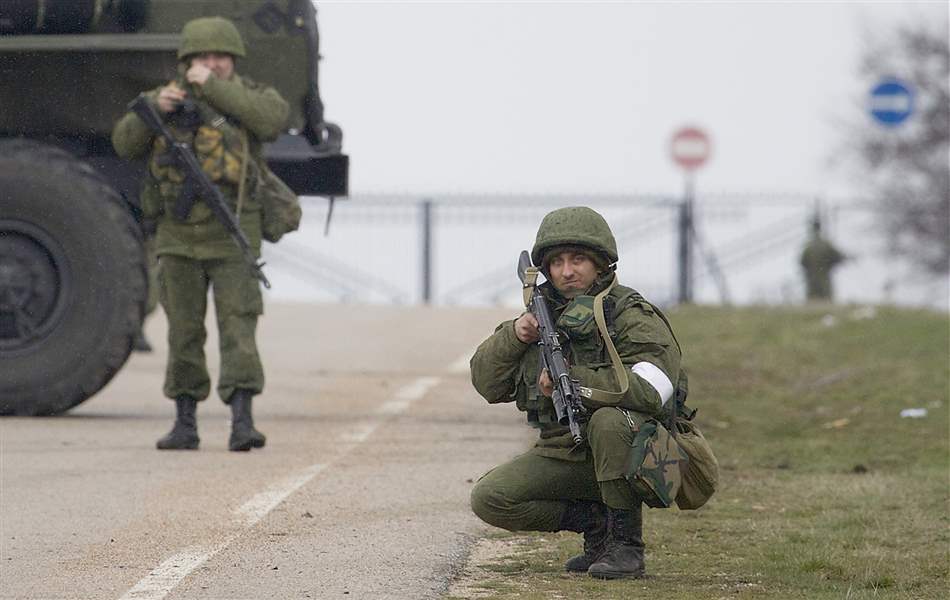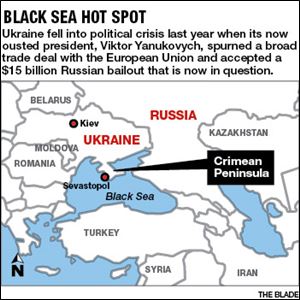
Ukraine claims Russian invasion as troops seize airports in Crimea
Military activities outlined at U.N. talks
3/1/2014
Soldiers take up position along a road toward the military airport at the Black Sea port of Sevastopol in Crimea, Ukraine, on Friday.
ASSOCIATED PRESS

Soldiers take up position along a road toward the military airport at the Black Sea port of Sevastopol in Crimea, Ukraine, on Friday.
SEVASTOPOL, Ukraine — Armed men described as Russian troops took control of key airports in Crimea on Friday and Russian transport planes flew into the strategic region, Ukrainian officials said, an ominous sign of the Kremlin’s iron hand in Ukraine.
The sudden arrival of men in military uniforms patrolling key strategic facilities prompted Ukraine to accuse Russia of a “military invasion and occupation.”
At the United Nations, Ukrainian Ambassador Yuriy Sergeyev said that 10 Russian transport aircraft and 11 attack helicopters had arrived in Crimea illegally and that Russian troops had taken control of two airports in Crimea.
He described gunmen posted outside the two airports as Russian armed forces as well as “unspecified” units.
“Some of them identified themselves as Russians. We know specifically some of the units,” Mr. Sergeyev said.
He also said the Russians had captured the main air traffic control center on Crimea.
Russia kept silent on claims of military intervention, even as it maintained its hard-line stance on protecting ethnic Russians in Crimea, a territory that was once the crown jewel in Russian and then Soviet empires.

U.S. Ambassador Samantha Power, in words that previewed remarks President Obama made later, said that Washington was “gravely disturbed by reports of Russian military deployments into the Crimea.”
“The United States calls upon Russia to pull back the military forces that are being built up in the region, to stand down, and to allow the Ukrainian people the opportunity to pursue their own government, create their own destiny, and to do so freely without intimidation or fear,” she said.
Ms. Power, like Mr. Sergeyev, declined to characterize Russian military actions when asked if they constituted aggression.
She called for an independent international mediation mission to be quickly dispatched to Ukraine.
Russian Ambassador Vitaly Churkin neither confirmed nor denied the specifics of any Russian military movements in the Crimea, but said that any Russian activities there were in keeping with Moscow's arrangement with Ukraine on the deployment of military assets there.
“We are acting within the framework of that agreement,” he said.
Russia is supposed to notify Ukraine of any troop movements outside the Black Sea Fleet naval base it maintains in Sevastopol under a lease agreement with Ukraine.
The Russian Foreign Ministry said military vehicles were deployed to ensure the security of its base and didn’t contradict the lease terms.
A duty officer at the Ukrainian Defense Ministry said it had no information about the vehicles’ movements.
Russia has criticized Ukraine's new government and voiced support for ousted President Viktor Yanukovych, who resurfaced in Russia on Friday to deliver a defiant condemnation of what he called a “bandit coup.”
Appearing for the first time since fleeing Ukraine last week, Mr. Yanukovych struck a tone both of bluster and caution — vowing to “keep fighting for the future of Ukraine,” while ruling out seeking Russian military help.
“Any military action in this situation is unacceptable,” Mr. Yanukovych told reporters in the city of Rostov-on-Don, near the border with Ukraine.
Earlier Friday, journalists in Crimea saw a convoy of Russian armored personnel carriers on a road between the port city of Sevastopol, where Russia has a naval base, and the regional capital, Simferopol.
Russian armored vehicles bearing the nation’s tricolor rumbled across Crimea and men described as Russian troops took position at airports and a coast guard base.
Oleksandr Turchynov, who stepped in as president after Mr. Yanukovych fled Kiev last weekend, urged Russian President Vladimir Putin to stop “provocations” in Crimea and pull back military forces from the peninsula.
Mr. Turchynov said the Ukrainian military would fulfill its duty but would not be drawn into provocations.
In Kiev, Ukraine’s newly named interior minister accused Russia of military aggression.
“I can only describe this as a military invasion and occupation,” Arsen Avakov wrote in a Facebook post.
Meanwhile, the prosecutor-general’s office said it would seek Mr. Yanukovych’s extradition to Ukraine, where he is wanted on suspicion of mass murder in violent clashes last week between protesters and police that left more than 80 people dead.
Ukraine’s telecom provider, Ukrtelecom JSC, said unknown people seized several communications centers in the Crimea, knocking out the company’s ability to connect the peninsula with the rest of the country. The statement on the company’s Web site said there were almost no landline, Internet, or mobile services operating in Crimea.
Ukraine’s population is divided in loyalties between Russia and the West, with much of western Ukraine advocating closer ties with the European Union while eastern and southern regions look to Russia for support.
Even as reports circulated about Russian military activities in Crimea, Mr. Putin held a series of phone conversations with European leaders in which he agreed — according to a British account of his conversation with Prime Minister David Cameron — to Ukraine’s holding new presidential elections in May.
The report suggests the Kremlin is resigned to a new leadership there to replace Mr. Yanukovych.
But in his news conference on Friday, Mr. Yanukovych vowed to return to power, however improbable that now seems, given the erosion of his political support.
Mr. Yanukovych denounced the new interim leaders in Ukraine’s capital as fascists whose actions had been abetted by the West and said the legal moves they had taken since he fled Kiev a week ago had no standing.
Among those, he said, was the resolution stripping him of his authority because he had effectively abandoned his presidency.
“Nobody deposed me,” he said. “I had to leave Ukraine because there was a direct and imminent threat to my life.” He called for a restoration of the government that he once led.
He said that the events in Crimea were a “natural reaction” to what he called a “gangster coup” in Kiev by violent nationalists.
Mr. Putin’s strategy remains unclear.
On Friday the Kremlin announced that he had told his ministers to continue contacts with their counterparts in Ukraine regarding trade and economic ties and would work with the International Monetary Fund and other countries to organize economic aid.
He also pledged to respond to appeals from Crimea for humanitarian aid.
But Mr. Putin has yet to make public remarks about the crisis in Ukraine since Mr. Yanukovych fled Kiev.
Mr. Yanukovych said he was surprised, “knowing the character of Vladimir Vladimirovich Putin,” that Russia’s leader had so far maintained a studied silence on the events, referring to him formally and respectfully by his full name and patronymic.
“I believe that Russia must and is obliged to act,” he said.
He did not say how, though.
Crimea became part of Ukraine in 1954 when Soviet leader Nikita Khrushchev transferred jurisdiction from Russia.